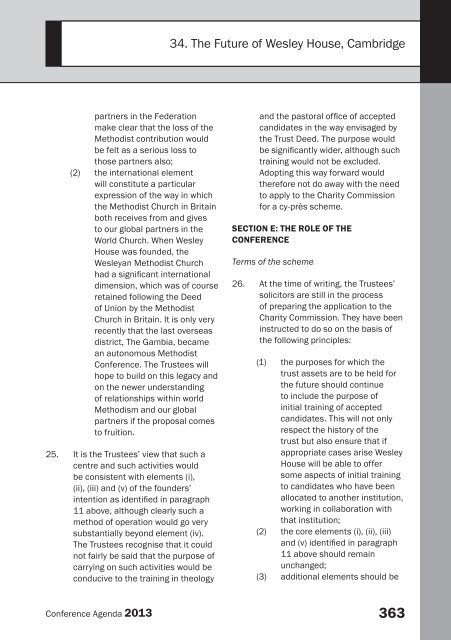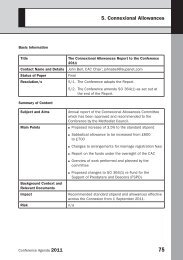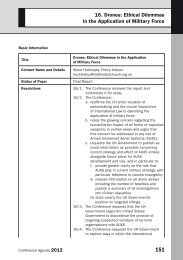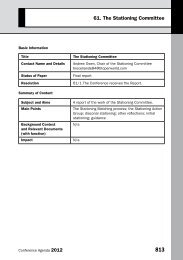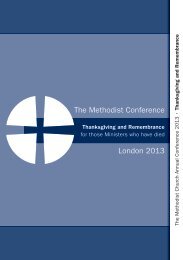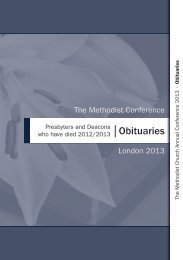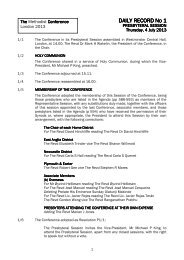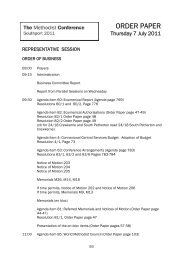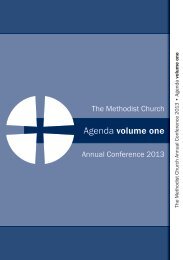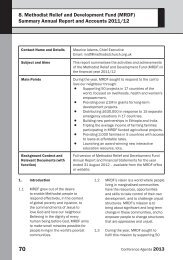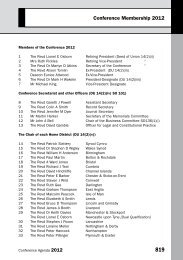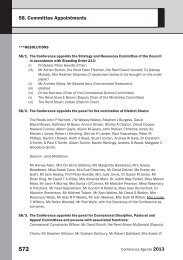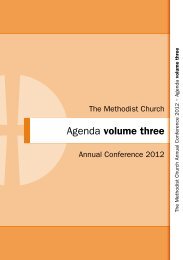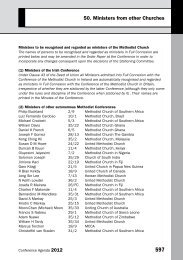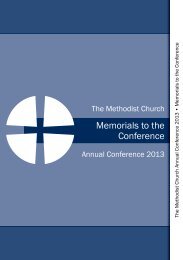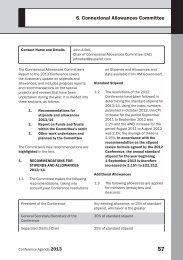Agenda Volume 2 - Methodist Conference
Agenda Volume 2 - Methodist Conference
Agenda Volume 2 - Methodist Conference
You also want an ePaper? Increase the reach of your titles
YUMPU automatically turns print PDFs into web optimized ePapers that Google loves.
34. The Future of Wesley House, Cambridge<br />
partners in the Federation<br />
make clear that the loss of the<br />
<strong>Methodist</strong> contribution would<br />
be felt as a serious loss to<br />
those partners also;<br />
(2) the international element<br />
will constitute a particular<br />
expression of the way in which<br />
the <strong>Methodist</strong> Church in Britain<br />
both receives from and gives<br />
to our global partners in the<br />
World Church. When Wesley<br />
House was founded, the<br />
Wesleyan <strong>Methodist</strong> Church<br />
had a significant international<br />
dimension, which was of course<br />
retained following the Deed<br />
of Union by the <strong>Methodist</strong><br />
Church in Britain. It is only very<br />
recently that the last overseas<br />
district, The Gambia, became<br />
an autonomous <strong>Methodist</strong><br />
<strong>Conference</strong>. The Trustees will<br />
hope to build on this legacy and<br />
on the newer understanding<br />
of relationships within world<br />
Methodism and our global<br />
partners if the proposal comes<br />
to fruition.<br />
25. It is the Trustees’ view that such a<br />
centre and such activities would<br />
be consistent with elements (i),<br />
(ii), (iii) and (v) of the founders’<br />
intention as identified in paragraph<br />
11 above, although clearly such a<br />
method of operation would go very<br />
substantially beyond element (iv).<br />
The Trustees recognise that it could<br />
not fairly be said that the purpose of<br />
carrying on such activities would be<br />
conducive to the training in theology<br />
and the pastoral office of accepted<br />
candidates in the way envisaged by<br />
the Trust Deed. The purpose would<br />
be significantly wider, although such<br />
training would not be excluded.<br />
Adopting this way forward would<br />
therefore not do away with the need<br />
to apply to the Charity Commission<br />
for a cy-près scheme.<br />
SECTION E: THE ROLE OF THE<br />
CONFERENCE<br />
Terms of the scheme<br />
26. At the time of writing, the Trustees’<br />
solicitors are still in the process<br />
of preparing the application to the<br />
Charity Commission. They have been<br />
instructed to do so on the basis of<br />
the following principles:<br />
(1) the purposes for which the<br />
trust assets are to be held for<br />
the future should continue<br />
to include the purpose of<br />
initial training of accepted<br />
candidates. This will not only<br />
respect the history of the<br />
trust but also ensure that if<br />
appropriate cases arise Wesley<br />
House will be able to offer<br />
some aspects of initial training<br />
to candidates who have been<br />
allocated to another institution,<br />
working in collaboration with<br />
that institution;<br />
(2) the core elements (i), (ii), (iii)<br />
and (v) identified in paragraph<br />
11 above should remain<br />
unchanged;<br />
(3) additional elements should be<br />
<strong>Conference</strong> <strong>Agenda</strong> 2013<br />
363


